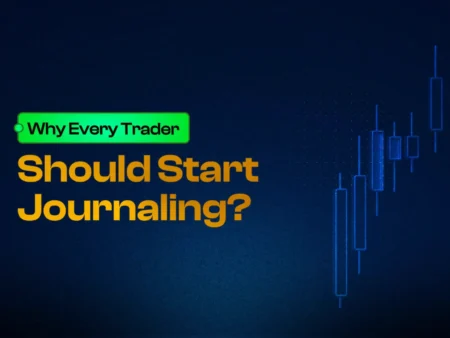I used to treat trading like a game. Win some, lose some, just part of the hustle, right? But after blowing through more accounts than I’d like to admit here, I realized something had to change. It wasn’t a lack of knowledge or effort. I just had no idea what was actually working for me or against me.
The turning point? Keeping a forex trading journal.
Not the prettiest solution, I’ll admit. But once I started tracking my trades, every win, every foolish mistake, every pattern I kept repeating; it was like someone turned the lights on. I saw where I was sabotaging myself. I saw what I did right. And most importantly, I stopped guessing.
Most people think great traders have some secret edge. I believe what they really have is clarity. And that clarity comes from brutal honesty and a journal that doesn’t lie.
Why Most Traders Fail Without Journaling
I used to think I had a good memory until I caught myself making the same silly trade three days in a row.
No joke. Same setup, same mistake, same outcome. And I didn’t even realize it until I went back and looked through my paper notes.
That’s the thing: without a forex trading journal, it’s way too easy to lie to yourself. You forget why you entered, forget what you were feeling. And you tell yourself you’re “getting better,” but based on what? Gut feeling?
If you’re not tracking what you’re doing, you’re guessing. And that’s when emotional trading slips in. You start reacting instead of thinking, ultimately chasing losses, forcing setups, getting spooked too early or holding on too long.
Writing it all down sucks sometimes. But it’s the only way I stopped trading on impulse and started actually improving. You don’t need to be perfect, you just need to be honest. And that starts with a journal that tells you the truth, whether you like it or not.
What Top Traders Actually Track (That Most Don’t)
Most people think keeping a trading journal means writing down your entry, your exit, and how much you made or lost. That’s surface-level stuff. Any trading app can show you that data. What separates serious traders from the rest? They dig deeper.
If you want consistent trading results, you need to understand what’s behind your trades not just the numbers, but the decisions, the emotions, the habits. That’s where the real difference is. And that’s what a proper forex trading journal helps to uncover.
Here’s what I started tracking once I got serious:
- Why I Took the Trade
Not just the setup. Was it part of the plan or was I forcing something? FOMO, boredom, revenge: all of it shows up here. - Time of Day
I noticed I trade better in the morning. Late afternoons? Silly decisions. You won’t spot patterns like this unless you use a forex trading journal. - Market Conditions
Trending? Choppy? News-driven chaos? I need to know what kind of environment I was trading in, some conditions fit my style, others don’t. - Risk Percentage
How much was I putting on the line? If I lost, would it hurt or ruin my day? Keeping this in check has saved me more times than I can count. - Confidence Level (1–10)
I rate it before I enter. Not gut feeling just a quick self-check. If I’m entering with a 3/10 confidence, what the hell am I doing? - How I Felt (Before, During, After)
Nervous? Rushed? Overhyped? This one’s big. Most bad trades I’ve made had nothing to do with strategy and everything to do with emotion. - Plan vs. Execution
Did I stick to the plan? Or did I jump ship halfway through? If I followed the plan and still lost, I can live with that. If I panicked and messed it up, that’s on me.
One thing I learned: the result doesn’t always tell the whole story. Sometimes I lose money but trade well. Other times I win, but the trade was trash. The forex trading journal keeps me honest. It shows me how I’m trading, not just what I’m trading.
If you’re only tracking your P&L, you’re missing the bigger picture. The real goal of a forex trading journal is growth. That’s how the best traders sharpes their edge and stay consistent by learning from their own data, not guessing.
Real Benefits To Notice Within 30 Days of Journaling
Let’s be real, I won’t lie, keeping a daily trading log doesn’t sound exciting. At first, it feels like homework. Another thing to do after a long day staring at charts. But give it a few weeks, and you’ll notice something shifts.
You stop trading blind. You start trading with purpose.Here’s what actually starts to happen after a month of using an analytical forex trading journal:
- You Spot Patterns You Never Knew Existed
It’s one thing to take a loss, it’s another to realize you keep losing the same way. Same time of day. Same setup. Same emotional trigger. Once it’s in the log, the truth hits harder. You start seeing the trades you should be taking… and the ones you’ve got no reason to chase. - Your Confidence Doesn’t Feel Fake Anymore
You stop hoping and start knowing. That shaky “I think this will work” feeling gets replaced by “I’ve seen this setup win over and over.” When your decisions are backed by your own data, you stop hesitating. You pull the trigger with clarity. - Your Trading Discipline Gets Real
If you’re not tracking mistakes, it’s easy to repeat them. Journaling forces you to own every screw-up. It’s humbling, yeah! but also freeing. You catch yourself before you revenge trade. You pause before you size up too much. You finally start sticking to your damn plan. - You Drown Out the Noise
Most people trade like they’re chasing fireworks. One flashy move after another. But with a journal, you learn to ignore the chaos. You focus on the stuff that actually fits your system. The rest? An obvious background noise.
Here’s the part nobody tells you: the edge isn’t always in the strategy. Sometimes, it’s in the self-awareness. And a forex trading journal is how you build that.
The Real Difference Between a Trader and Someone Just Clicking Buttons
Eevery serious trader I know keeps a journal. Not because someone told them to. Not because it’s trendy. Because if you don’t log things down, you’re guessing. And guessing in trading will empty your account faster.
Back when I started, I’d lose a trade and immediately start pointing fingers “Bad luck,” “News hit,” “The market’s rigged.” Sound familiar? Yeah, me too. But the moment I started keeping a proper forex trading journal, things changed. I wasn’t just tracking wins and losses. I was tracking me. My behavior, thinking, and my screw-ups.
You start noticing things you never saw before. Like how your worst trades come after a big win. Or how you keep forcing setups around lunchtime when nothing moves. That’s not random. That’s your trading psychology messing with you, and if you don’t track it, you can’t fix it.
People talk a lot about having an edge. Here’s the truth: most of your edge won’t come from a strategy. It comes from knowing yourself. And that starts with honest trade analysis, every entry, every exit, every emotion. The stuff nobody wants to look at, but pros do anyway.
If you’re not journaling, you’re not trading seriously. Full stop.
How to Start Your Own Trading Journal Today
Forget the polished templates and color-coded spreadsheets you see on Instagram. If you’re serious about improving, the only thing that matters is starting. That’s it.
You don’t need some high-end setup. The best forex trading journal is the one you’ll actually stick with.
If you want simple, start with a Google Sheet. Put the basics: date, pair, entry, exit, what the market was doing, and what you were feeling. Doesn’t have to look pretty, just be honest. That’s how you start understanding your own patterns. That’s how real trade analysis begins.
More visual? Use Notion. Throw in screenshots, notes, whatever helps you see the full picture. What were you thinking when you entered that trade? What did you ignore? Were you following your plan or just reacting?
If you’d rather not build anything from scratch, use a journal app. Forex trading journal apps are equipped with most advanced analytical modules that makes your decisions to perform backed by your data, just your own kind. I tried Tradezella after blowing up my third account. It showed me patterns I didn’t want to see but I needed to. One click and I could see how my trading psychology nosedived after a losing streak. That’s when it started to click: journaling isn’t busy work, it’s survival.
There’s no “right way” to journal. Just start. Track your trades, your thoughts, and track the parts you usually ignore. Because that’s where the edge really is.
Conclusion
If you’re still reading, then yeah—you already get it. This isn’t just about “being consistent” or following some mentor’s checklist. It’s about knowing yourself. And the only way to really know how you trade is to keep a record of it.
Not for show. Not for stats. For you.
Your forex trading journal is where the real growth happens. You’ll catch things you never saw in the moment. Sloppy entries. Emotional exits. The way one irrational win makes you feel invincible, or how a bad loss wrecks your head for the next three trades. That’s trading psychology, and you can’t fake your way around it.
Look—in trading it doesn’t matter how smart you are or how many setups you’ve memorized. It rewards people who study themselves, who learn from their own mess, and who keep showing up with a little more clarity each time.
So here’s something simple: journal every trade for the next two weeks. Nothing fancy. Just write what you did, why you did it, how you felt. That’s it. You’ll start to see the patterns. The stuff that keeps tripping you up. The things that actually work.
And once you see it… it’s hard to unsee.
Most traders stay stuck because they never stop long enough to figure out what’s actually going wrong. Don’t be that trader. Write it down. Look at it. Learn from it.
That’s how you get better. That’s how you get paid.



